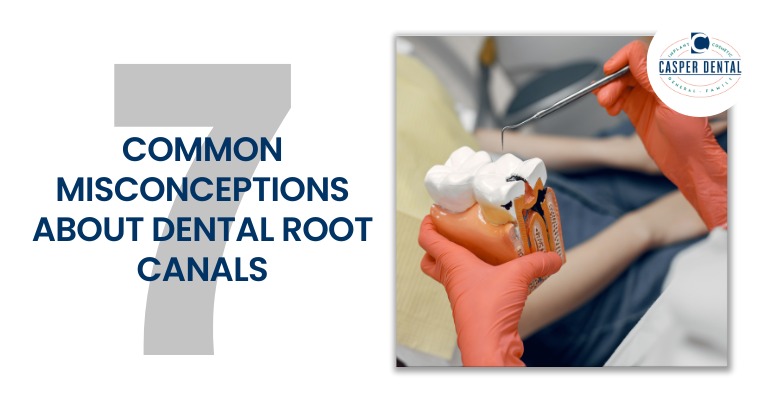When it comes to dental procedures, no matter how crucial they are for oral health, few terms immediately strike fear in the hearts of patients. One of these is ‘Root Canal.’ They have garnered a reputation for being excruciatingly painful and associated with lengthy, recovery times and numerous health risks. However, it’s time to set the record straight and debunk some common myths surrounding dental root canals. In this article, we’ll navigate through the misconceptions to provide a clear understanding of this often misunderstood procedure.
Myth 1: Root Canals are Excruciatingly Painful
One of the most prevalent myths about root canals is that they are excruciatingly painful. Contrary to popular belief, advancements in dental technology and anesthesia have transformed the root canal experience. At Casper Family Dental, we employ state-of-the-art techniques to ensure that the procedure is virtually painless. During a root canal, the infected pulp within the tooth is removed, relieving pain caused by inflammation and infection. At your favorite Richland family dental, we have a team of anesthesia specialists with a wealth of expertise. Local anesthesia is administered to numb the area thoroughly, ensuring a comfortable experience for the patient.
Myth 2: Root Canals cause Illness
An enduring misconception links root canals to systemic illnesses. Conspiracy theories claiming that over 90% of cancer patients have undergone root canal treatment in the past have circulated over the past few decades. However, contemporary studies have unequivocally refuted any connection between root canals and cancer. It is more plausible that any correlation is associated with the infections and inflammation prompting the necessity for root canal treatments, rather than the treatment itself, which effectively addresses and removes those infections and inflammation. This is why any Richland dentist would unhesitatingly advocate dental root canals as a safe and effective approach to preventing the spread of infection without compromising your overall health.
Myth 3: Sedation is Mandatory for Root Canals
It’s crucial to note that sedation is not a mandatory component of every root canal procedure. The necessity for sedation depends on various factors, including the complexity of the case, the patient’s anxiety levels, and the dentist’s assessment of the individual’s overall health. Local anesthesia is the primary method employed to ensure a pain-free experience during a root canal. This localized numbing agent effectively blocks sensations in the targeted area, allowing the dentist to perform the procedure while the patient remains fully conscious.
Sedation may be offered as options for patients who experience heightened anxiety or fear associated with dental procedures. If that’s the case with you, do not hesitate to talk to your Richland dentist, to ensure a positive and stress-free experience.
Myth 4: Tooth Extraction is a Better Alternative
Some individuals believe that extracting a tooth is a simpler and less troublesome option than undergoing a root canal. However, any Richland family dental services would strongly advise against unnecessary tooth extractions. Preserving natural teeth whenever possible is paramount, as it contributes to maintaining proper oral function and well-rounded oral hygiene.
Tooth extraction may seem like a quick solution, but it comes with its own set of challenges. Replacing a missing tooth later on can be more complex and expensive than saving the natural tooth through a root canal. At Casper Family Dental, we advocate for a comprehensive approach that prioritizes preserving the integrity of your natural smile.
Myth 5: Root Canals take Multiple Appointments
Another common misconception is that root canals are time-consuming, requiring multiple appointments. In reality, many root canal procedures can be completed in a single visit, thanks to advancements in technology and the expertise of dental professionals. Additionally, efficiency in root canal procedures does not compromise their effectiveness. The focus is on thorough treatment to remove infected pulp and prevent further complications, all while ensuring a convenient experience for the patient.
Myth 6: Only Severely Damaged Teeth Need a Root Canal
There’s a misconception that root canals are only necessary for severely damaged teeth. However, talk to your Richland dentist and might recommend the procedure for teeth with deep decay or infection that hasn’t yet caused visible damage. Early detection and intervention are critical in preserving teeth. If there’s an infection or deep decay, a root canal can address the issue before it progresses to a more severe stage, ultimately saving the natural tooth and avoiding more invasive treatments.
Myth 7: Root Canals Remove Tooth’s Roots
Contrary to popular belief, root canals do not entail the removal of a tooth’s roots. The procedure specifically addresses infected or inflamed pulp within the tooth, preserving its essential structure. By cleaning and sealing the root canals, dentists effectively eliminate the source of infection, aiming to save the natural tooth. Root canals are a restorative approach, prioritizing tooth preservation over extraction.
Demystifying these common misconceptions about root canals unveils the procedure’s true nature—a safe and effective way to save a natural tooth. Casper Family Dental is equipped with a team of skilled and compassionate dentists, dedicated to providing accurate information and ensuring a pain-free, stress-free experience for patients undergoing root canals.


